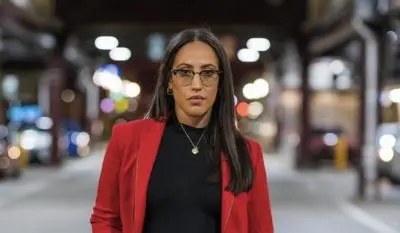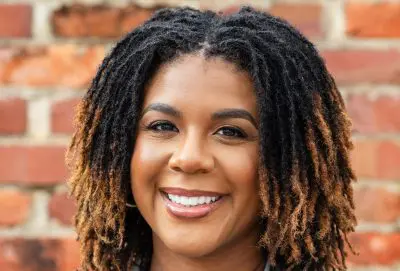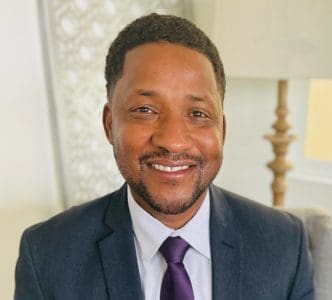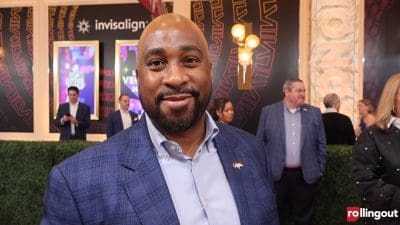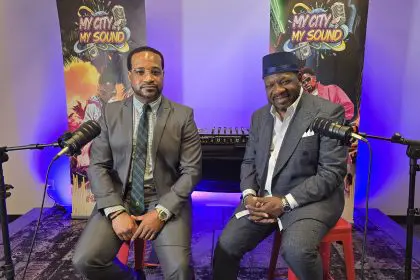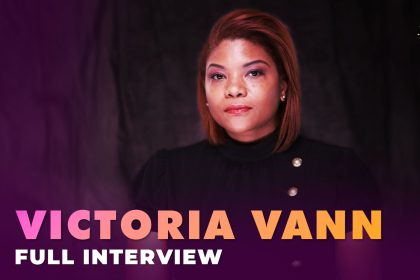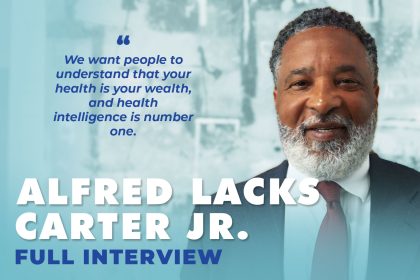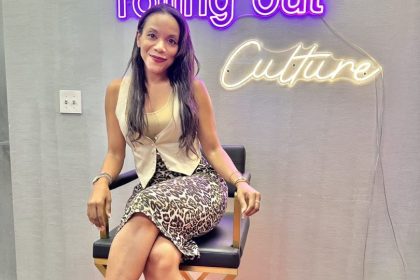Lenwood V. Long, Sr., is the Chief Executive Officer of the African American Alliance of CDFI CEOs, a coalition of CEOs of Community Development Financial Institution (CDFI) loan funds, credit unions, and venture capital funds representing all 50 states and the District of Columbia. In his time as President/CEO, Long has assisted the Alliance in surpassing its fundraising goal of over $1 million in the first six months of operation, and established and managed a grant management system that awarded over $1.1 million in grants to its members within the first five months.
He is especially noted for his work with African-American small businesses, women entrepreneurship, veterans, and HBCUs. He spent a few moments with rolling out publisher and CEO Munson Steed for an edition of CEO to CEO. Here is their conversation.
Munson Steed: Hey everybody, this is Munson Steed, and we are on a seat at the table where we bring you individuals who are examining why and how we are not at the table, how we should be at the table, who’s blocking our access to the table and being able to move forward as a community. Humanity has its place on many tables, but this is a table about opportunity and those who would continue to oppress those individuals who are wanting to be at the table, or who should be at the table, but those individuals and movements that are keeping us away from making economic progress for both females, black and brown and others from making it to the table. My esteemed guest today, here to see at the table is my brother Linwood, V. Long, Sr. How are you?
Lenwood V. Long, Sr.: Doing well! Let me commend you for, allow another voice to be raised and the work you do to center many of your artists thinking around issues of the day, especially those issues that impact black and brown America.
MS: So, when you think about the value proposition of how our communities, both black and brown are moving forward or backwards by some standards given there, is a still an oppression. Can you give us kind of a historical on what it is and has been. And then, all of a sudden, what? We’ve got a new challenge by those individuals who want to roll time and opportunity further back.
LL: Yeah. Well, thank you for setting the table with that, I do want to say this briefly that, again, Lenwood Long, CEO, of the African American Alliance of CDFI CEO’s — that’s a mouthful, but literally our work black lives CDFI’s re-emanated from the reality that black-ed CDFI’s compared to white-led CDFI’s found the data [to] say that the web gap or the capital gap between black-led and white-led was six to one, and so the premises are our way dealt with trying to close the virgin racial web gap. As you well know, they’ve been various tools over the years — affirmative action being one, diversity and equity, initiative being another — to do what? To close the racial wealth gap, to be in position about
leveling the unlevel and feel for black and brown folks, as it relates to economics.
MS: One thing, so I want to make sure that those who are watching don’t unimagine the fact that one we were transported here and truly suffered no economic progress, while others did for 200, some years, just automatic.
MS: So, a 250-year-plus or more head start by everybody else that wasn’t black. Literally, a head start [that] totally oppressed [us], enslaved [us], while everybody else developed on land, was able to read, we’re setting the table here again. This is before, so now everybody has a 250-plus, or at least 200-year head start and then you still come into Jim Crow laws that don’t allow you to even walk the streets at night, go through counties or vote. How does that set you back economically? I think it’s probably bigger than ten, one to 6. But why we would even be asking to make sure there’s some removal of that wealth gap.
Long decries ‘odds that have been stacked against black folks’
LL: You set a daunting table, for the odds that have been stacked against black folks when it come to America, right, from where we came involuntarily to this country and helped build this country, that will pay decent wage, a little wage-enslaved and being mentally enslaved for years. Had one brief opportunity to thrive, then Jim Crow arrived and crippled that, and we’ve been struggling all our lives to talk about a level playing field that’s never been level. And so, when you look at the myriad of issues that you laid before your audience is a wonder.
Jess talks about the sheer determination of black folks, to even be around today to have these kind of discussions, given what we’ve been through yet, but by the grace of God, here we are having this conversation — in the midst of the struggle, in the midst of the fight and the midst of the loss of lives and the midst of being brutalized, beaten, ostracized, women raped, and all those things, and yet still we have to fight every step of the way. And those that come lately, saying that the plan field is level, and we don’t want to give black folks, first of all, black folks don’t have the kind of power to make decisions economically, they’re putting them in front of anybody else.
But to say that America is now colorblind, that’s ridiculous, America has never been colorblind. If you’ve follow the ages and follow the voices from Frederick Douglass … I always quote Douglass, saying that power never conceives anything without a demand, never has and never will.
And so, we’ve been demanding, but never have response to demand for economic equality in this nation and how dare anyone to sue us to suggest that what we have achieved and have been trying to march to achieve, with marginal results of program design to at least try to give us opportunity. They’re saying we don’t need those now, and that’s nonsense, we do, because the playing field is not level. You know farm guy, I know what it means, when you plant whatever you want to plant, you want to make sure the ground is level as much as possible. But here in America it is not so, and for anybody who want to perpetrate this notion, well-funded notion, billionaires, then all we can think about and it’s time for you to keep ahead and to suggest that any efforts around DNA gives one group advantage. That’s nonsense.
Makes me mad, to be honest with you, just to be frank.
MS: When you talk about a CDFI, for those who don’t know why CDFIs, African American led CDFIs exist. Can you share why even the coalition, the collective thought, and the collective need exist for our community?
LL: Yeah. So let me break it down this way. When you look at CDFI, one of the way, not only are they mission lenders and provider and housing. But I call them gap fields. In other words, they’re meeting needs that traditional financial institutions with the services they provide for this housing, our small business loan, our commercial real estate, our venture capital, our credit union. They are avenue in ways in which black and brown people can participate in the mainstream of economics. That if you pull out black led CDFIs around this nation, the opportunities and housing and an opportunity and small business development would be ‘hey’, we wouldn’t have this opportunity for people to fulfill their dreams if you’ve just closed the gap and move black led CDFIs out of the way. We just know, have any idea of the services that they provide to many dreamers around small business, and first-time homebuyers, without those resources that wouldn’t exist.
MS: You speak of existing when you have the attack on brands going to black women or internships going to Hispanic children. What is that doing to that community, to their families, and what is it really doing to the wealth gap when you stop the process of at least attempting to address the disparities that are both historical and factual in home-ownership, in banking and lending, in venture capital, and others?
Don’t get Long started about ‘fake news’
LL: Well, that’s a great question and I think when you really look at it, you’re really cutting out aspirations, and hope, of those who expand, to move above the whatever level they are currently existing? When they think about your achievements and others achieve them, and expand to do that, when you look at opportunities to attend some of the best colleges and universities. When you look at underfunded HBCUs and their crippledness they have, because the lack of resources, it cuts down on the aspiration of younger generations who dream about, “Yes, I can,” and began to have doubt of whether they can be who God created for them, intended to be, because of the roadblocks being placed up, and these time with this false narrative that things are equal.
When you think about it just black women alone when you talk about venture capital, less than 1%, right, .39% of black women access venture capital, Overall, less than 1% of black entrepreneurs access venture capital and when you look at the racial wealth gap, it’s almost ten to one and growing when you look at that. So, when you talk about things being level, that’s a false narrative. You’re talking about a narrative that it rips the hope, and dreams, and aspiration, of people who want to be and who want to realize and want to participate in the economy that they see slipping away from them by these false narrative you talking about fake information. That’s what I call it, fake news.
MS: Fake news. For those who don’t understand, CDFIs are actually making loans to first-time home buyers. … How did that set us back when you think about what it’s like the generation of wealth that was passed, and it was actually illegal for us to own homes and it wasn’t that long ago?
LL: Well, not long ago, when you think about just how CRA [the Community Reinvestment Act] came into existence to address redlining, right? Where you couldn’t go to a bank in certain areas of where you live matters, right? It matters that you couldn’t get a home there because of your ZIP code of whether the railroad went. America was bifurcated by race and economic class, and all these things, and over the years it has perpetuated and wider, and that’s why you look at whether it’s home ownership, or whether small business loans that you have not been able to access the capital.
You haven’t been able to gather the wealth. A great way of creation in America today is real estate and that’s how we did in 2008, when we had the economic development, economic meltdown in this country — black folks never have recovered from that. Meltdown, it mail us down, it really mail us out, and we haven’t been able to rebound from that. If you look at home ownership in 2008 and compare it today, percentage-wise, we’ve lost right? And that’s why, if you look at [all] indices of wealth. Now, I wanna point this out to you because that I think I just say, follow the data in the interest that every group come into America bypass us on the economic level. If you look at the racial web gap, it is African-American at the bottom, and then our brother and sister Latinos ahead of us, and then, white folks, and the gap keeps widening. And why is it that we always stay left behind? And when the saying like, we’re making progress, then you have this nonsense coming in to say that things are even, and so now, we want to make sure you compete like everybody else. That’s nonsense.
MS: We talked about nonsense and having a seat at the table. What can and should you and would you like to see the community do right now to let their voices and what you would like to be done at this second?
LL: I’m glad you said that and what it is we can do. I think we’ve become too comfortable. … We’ve allowed some of our leaders and some of the people we vote for, perpetuate that same lie that they’re going to do things to increase the wealth in our community. and we had the same old package every time, and the package never comes with a big deal for us. So, what we have to do is change our behavior, and began to let our voices be raised and saying, that enough is enough. and that, you know.
I want to use this an example, when you look at every federal program as opposed to move the needle for black folks, whether it’s new market type credit, whether it’s opportunities on, what happened? You’d get mass gentrification in our communities, we get strip, wealth is extracted, nothing is recycled in our community and so until we wake up and start to really raising our voices and a plan call enough and say that we mobilize our voices and effort to ensure, and do as Douglas demand action from those who have the power to make change in our community. We’ve become too complacent.
MS: That leads me to one of my final questions. If you were giving a state of the black economic psychology, what would you say that our psychology, how are we faking ourselves out to act as though we’re making progress and have more seats when all economic indicators over the last 50 years of hip hop suggest that there isn’t growth for our future generations?
LL: Yeah, I think that’s an interesting perspective, but the psychology of around our psyche, if I was looking at it, just to pay my observation. If we get satisfied with little and we get happy about maybe the progress of somebody else, and not realizing the progress we are making, that will stuff, and we’ve been content with it with the idea that things don’t get better tomorrow, and that, it never happened, and then the same, we become satisfied with the little as opposed to one in the much and began to live that little with that much aspiration about being that we can do better by pursuing those things, and demanded, I’m gonna use that word again because I think it’s important, “demanded.”
Look at the 100,000 plus folks in Michigan who were uncommitted. What happened if black folks became a hundred-percent committed? We got 80%, or we got 40% committed, uncommitted to these politicians who give us empty promises. Now, I’ve got to say this, I wouldn’t leave without saying this for black men who say they don’t have no options: You are looking at some false narrative, because if you’re looking at options around somebody who has never done anything for us? Who’s gone us, who’s criticize, who vilified us, and who make a mockery out of us in our face? You have options, and your options get out here and stand up and demand action and quit running to alternative that don’t go anywhere. And so, I had to get that out of the way I’ve been saying that everywhere I go is that folks talk about options.
Yeah, you have some options, but the option is not greener grass than what you think and money promised to others that made it come to us that’s why we, in in the shape that we are. We’ve been tracing false narrative with little results, and we gotta wake up and we’ve got a mobilize our voice and not be give of this notion of conspicuous consumption that we. We consume a whole lot, we own a lot of material stuff, but we don’t recycle jack in our communities, and that goes to the faith community as well.
MS: You talked about recycling dollar seats at the table for those of us who understand that narrative. How important is our spending with each other, employing each other, important, and why?
LL: The data said, here’s what the data said — that as we grow black economy, as we grow black businesses, here’s what happened. Black businesses tend to have more black people, 1, 2, they tend to recycle dollars within the communities in which they operate, and they live. And so, when we began to recycle is the mother plan of impact in our community, and greater things began to happen, that we can grow and thrive and perhaps if we do it right, we can cut down on gentrification that’s taking place in our community. People can’t move, and where I can’t do anything because they have been economically squeezed out, and we don’t have an opportunity because we don’t own jack in order to do the kind of thing that we should be able to do with the business we have. We gotta learn how to support the businesses in operating that we know so they can have us and then we can grow and scale. That’s one way we close the racial wealth gap.
Long says don’t be ‘complicit’ in crime against blacks
MS: I love it, you said that should the black community [should] see gentrification as a crime?
LL: Oh, yes, it’s a crime that we’re complicit in help making committed.
MS: Describe.
LL: We are complicit in the sense that we see it happening and we keep electing and the same people who is a part indirectly, in some ways, directly of a line that happened. And so, we are part of this recycling politics and economics that perpetuate the same things that we sit there and watch it happen, but we don’t do anything about it.
MS: Last question, just following that saying. When you think of black mayors, should they play a role and be able to describe to their constituents, particularly black constituents, the economic numbers that demonstrate that they are protecting them, and their economic wealth, and that they are demanding from those individuals who are eating from the public through as though they understood the beneficiaries that they represent when they are soliciting our votes.
LL: I go further than that. I go further than that. Yes, I think you hold that accountability, and we’re so happy to have them at the seat at the table and elected, they’ll forget about holding them accountable to deliver. But I challenge every national black mayor organization, from the action network to urban lead to an NAACP. That there is an obligation, there is an obligation, I would say again, there’s an obligation to make sure that we do more than gather folks together, have a good time, feel good, big raise dollars to grow our organization, but don’t do jack for people who come first and hungry for information and knowledge about the opportunities that really is getting ready to happen. I wanna say this and in a few days, that’s gonna be an announcement about $27 billion getting ready hit the street for climate and environment.
My question is, how those organizations have the black males across the nation prepare, and our communities to make sure they are recipient of some of those funds. Now, I gotta say this is that, wouldn’t it be a shame if $27 billion hit America, and we got less than 1% of that? And why? Because we were not prepared by information. [The Bible says] “my people perish for lack of knowledge,” but we gather folks together, but we don’t give them the right information.
MS: Well, ladies and gentlemen, you heard it first here, Lenwood V. Long Sr, my dear brother, thank you for coming to a seat at the table. I look forward to future conversations. For all of you out there, you do not have to be in the streets, but you must be in the struggle. I’m Munson Steed, and this has been a seat at the table with Lenwood V. Long, Sr. and Munson Steed.
LL: So glad to have you, my brother. Thanks for giving me opportunity to share some things I feel very strong about.

